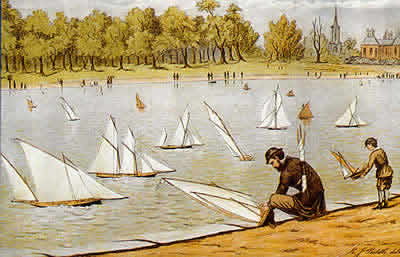|
This is an image that first appeared in Boy's Own Paper in 1883 as an
an oleo-lithograph illustration to an article rounding up the significant
events of the 1883 model yachting season. The article was by Tyrrel
E Biddle, the author in 1879 of the first 'how to do it' book on the
sport. The original watercolour from which it is drawn is by his brother
R F Biddle. Both had served as merchant navy officers in sail and had
been model yachtsmen for most of their lives; in retirement T E wrote
and R F painted. Both were members of MYSA at this date. R F died in
1884 or 1885
It is clear that R F could draw boats, even
if his grasp of figure drawing was a bit shaky. He shows a wide range
of types, all of which are known from other sources to have sailed on
the pond at this period. We can, I think, assume that they are accurate
representations of the boats he knew.

From left to right in the foreground they are:
-
A lug yawl, with the mizzen rigged with a lateen sail. Yawls were
favoured by the club as offering advantages if, as was frequently
the case, guying techniques had to be used going to windward. The
guy could be put on the mizzen, while the main was available to drive
the boat efficiently on both tacks. The lateen can only have been
a fad. This boat may have a solid forestay.
-
A schooner with square headed yard topsails, typical of both model
and full size practice of the time.
- A
conventionally rigged yawl.
-
(On the bank) a yawl or possibly a schooner with two lateen sails.
It is possible that this is a true lateen rig and has no headsails,
like the model in the middle distance on the left of the painting.
Note the 'quiver' in which the owner carries his spare rigs.
-
Immediately above the model on the bank, a cutter heading out from
the shore close hauled. The relative positions of the main and head
sails suggest that R F is representing a boat on a short guy.
- A
cutter running with a flat spinnaker set, followed by a smaller sloop
rigged boat, similar to that held by the boy on the bank, also with
a spinnaker.
-
A cutter beating on the long tack of the lake.
All the hulls appear to be conventional straight
stemmed, short counter styles, as encouraged by the MYSA Rule of the
time.
The representation of Kensington Church and Palace owes something to
artistic license, and they have been moved into the picture to make
the point that this is the Round Pond: there is no bandstand on the
far side of the lake, but it may have been built later than 1883.
back
|
